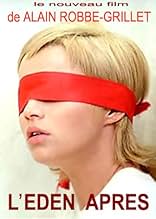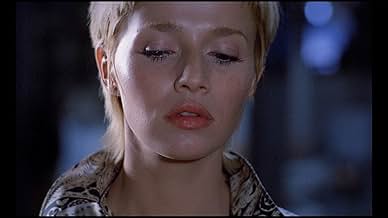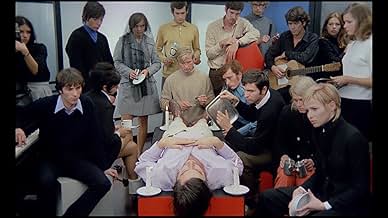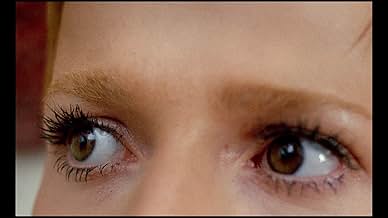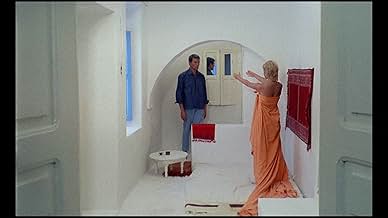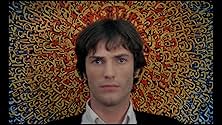VALUTAZIONE IMDb
6,4/10
1484
LA TUA VALUTAZIONE
Aggiungi una trama nella tua linguaA group of French students are drawn into the psychological and sexual games of a mysterious Dutchman. Once they sample his "fear powder" the students experience a series of hallucinations.A group of French students are drawn into the psychological and sexual games of a mysterious Dutchman. Once they sample his "fear powder" the students experience a series of hallucinations.A group of French students are drawn into the psychological and sexual games of a mysterious Dutchman. Once they sample his "fear powder" the students experience a series of hallucinations.
- Regia
- Sceneggiatura
- Star
- Premi
- 1 candidatura in totale
Jarmila Kolenicová
- Sonia
- (as Jarmila Kolenicova)
Ludovít Króner
- Franc
- (as Ludwik Kroner)
Eva Luther
- Violette's look-a-like
- (non citato nei titoli originali)
Recensioni in evidenza
This film isn't as good as it could've been but it still has a lot of merit and is worth seeing. There is some extremely memorable and disturbing imagery that got under my skin. A lot of these scenes and images were very effective and a lot of them are still stuck in my mind long after watching the film.
The films presentation as a whole is very solid. With some great sound design, beautiful technicolor cinematography and usage of its Tunisian setting. My main issue with this film is that it didn't really have a point overall and the story itself wasn't compelling enough to make up for that. For example with the film Last Year at Marienbad (also scripted by Alain Robbe Grillet) it has a lot of thematic depth and tonnes going on underneath the surface. Which is helped significantly by the hypnotic atmosphere. Eden and After doesn't really have that.
There's not a lot to take away from it and the atmosphere/story isn't particularly compelling. Which does make the film a bit of a slog at points despite the relatively short runtime. The films disturbing sexual imagery, sound design and surreal scenes do help the film a lot. Though I wished those elements were used for a much more compelling, thought provoking and disturbing film overall.
Eden and After is still a really interesting movie with a lot of great things going for it. Though unfortunately it's rather underwhelming which prevents me from calling it one of the great psychedelic/surreal films of the period. If all of the positive elements of this movie were used for a better film. I think this movie could've easily have been on par with Salo, Climax and The Devils which do a lot of what this movie is going for more successfully.
The films presentation as a whole is very solid. With some great sound design, beautiful technicolor cinematography and usage of its Tunisian setting. My main issue with this film is that it didn't really have a point overall and the story itself wasn't compelling enough to make up for that. For example with the film Last Year at Marienbad (also scripted by Alain Robbe Grillet) it has a lot of thematic depth and tonnes going on underneath the surface. Which is helped significantly by the hypnotic atmosphere. Eden and After doesn't really have that.
There's not a lot to take away from it and the atmosphere/story isn't particularly compelling. Which does make the film a bit of a slog at points despite the relatively short runtime. The films disturbing sexual imagery, sound design and surreal scenes do help the film a lot. Though I wished those elements were used for a much more compelling, thought provoking and disturbing film overall.
Eden and After is still a really interesting movie with a lot of great things going for it. Though unfortunately it's rather underwhelming which prevents me from calling it one of the great psychedelic/surreal films of the period. If all of the positive elements of this movie were used for a better film. I think this movie could've easily have been on par with Salo, Climax and The Devils which do a lot of what this movie is going for more successfully.
Philosophical thriller or Post-Modern jigsaw or S&M skinflick - or all three at once - Alain Robbe-Grillet's first colour film is a dazzling, at times frustrating experience. Try to imagine Alice in Wonderland crossed with Story of O and you may get some idea of the perverse sensibility at work behind it. Starting off in a labyrinthine, mirror-lined nightclub called Eden, moving on to a disused factory with huge industrial vats full of sperm, ending up on the Tunisian island of Djerba - with, naturally, a detour through a jet-set torture chamber where glamorous naked women are crucified or suspended in cages - Robbe-Grillet takes his wide-eyed and waif-like heroine (Catherine Jourdan) on a spiritual and erotic odyssey to...what exactly? Sorry, but I don't know either.
Nor does Robbe-Grillet seem the tiniest bit inclined to let us in on the secret. According to a mysterious stranger (Pierre Zimmer) who breaks in on Jourdan and her jaded pals, it's something to do with transcending the limits of rational Western consciousness. Finding a darker and more primitive reality. "Break on through to the other side" - or so The Doors might put it. Intriguing enough in a drugged-up late 60s kind of way, but Robbe-Grillet's own personal "doors of perception" don't seem to open very far beyond a spot of mild flagellation, or some Emmanuelle-style sex tourism on a photogenic Third World beach.
At least the film is exquisite to behold. Its imagery is bizarre and erotic and disturbing. Catherine Jourdan - who went on to make even weirder movies with director/husband Alain Fleischer - is a lovely heroine in the tradition of the Marquis de Sade's Justine. She combines the doe-eyed fragility of a Mia Farrow with the icy blonde sensuality of a Catherine Deneuve. As her lover, Richard Leduc is undeniably handsome - but he seems far too sweet and mild-mannered for some seriously nasty sex-games with a blindfold and a bucket of scorpions. As for any ultimate meaning, you may or may not want to work that out. I suspect most of us would be happier not knowing.
Incidentally, Eden and After is one of Robbe-Grillet's MORE linear films in terms of plot - yet it's also one of his hardest to grasp. Perhaps there's a lesson to be learned from that, but - once again - don't ask me what!
David Melville
Nor does Robbe-Grillet seem the tiniest bit inclined to let us in on the secret. According to a mysterious stranger (Pierre Zimmer) who breaks in on Jourdan and her jaded pals, it's something to do with transcending the limits of rational Western consciousness. Finding a darker and more primitive reality. "Break on through to the other side" - or so The Doors might put it. Intriguing enough in a drugged-up late 60s kind of way, but Robbe-Grillet's own personal "doors of perception" don't seem to open very far beyond a spot of mild flagellation, or some Emmanuelle-style sex tourism on a photogenic Third World beach.
At least the film is exquisite to behold. Its imagery is bizarre and erotic and disturbing. Catherine Jourdan - who went on to make even weirder movies with director/husband Alain Fleischer - is a lovely heroine in the tradition of the Marquis de Sade's Justine. She combines the doe-eyed fragility of a Mia Farrow with the icy blonde sensuality of a Catherine Deneuve. As her lover, Richard Leduc is undeniably handsome - but he seems far too sweet and mild-mannered for some seriously nasty sex-games with a blindfold and a bucket of scorpions. As for any ultimate meaning, you may or may not want to work that out. I suspect most of us would be happier not knowing.
Incidentally, Eden and After is one of Robbe-Grillet's MORE linear films in terms of plot - yet it's also one of his hardest to grasp. Perhaps there's a lesson to be learned from that, but - once again - don't ask me what!
David Melville
I suppose an argument on whether or not "Eden and After" is a load of pretentious twaddle or a film with real substance could go on forever, but whether or not there is more than the typical late 60's/early 70's drugged-out pseudo-intellectualism here is irrelevant. I don't think Robbe-Grillet's intention is to make a 'Grand Statement' of any sort, "Eden and After" seems interested mostly in asking questions and provoking a response from the audience, as well as in its aesthetic sensibilities.
"Eden and After" has been described as a highbrow soft-core flick, not only in another IMDb comment but elsewhere as well, and it's a fair enough label- many of the images here, particularly in the last forty minutes of the film are certainly erotic, or at least obviously were to Robbe-Grillet. Robbe-Grillet has achieved genuine sensuality with his imagery. It's not porn, there's none of the visceral satisfaction of that sort of thing, it's actually evocative enough to earn the 'erotica' label, although the film certainly has ambition beyond that.
Indeed, dismissing this as a skin flick is a bit moronic; there's so much more here. It's a dark, captivating, occasionally nightmarish, and very interesting film. The sound mixing here is absolutely superb, much like it was in the only other Robbe-Grillet film I've seen so far, "Trans-Europ-Express", and the cinematography stunning, especially after the film shifts focus to Tunisia in its final act. This was Robbe-Grillet's first color film and the opportunity is not wasted- everything from the minutest detail of the design to the cast's wardrobe is a carefully-orchestrated visual extravaganza of bold colors, often used very well in the film to emphasize a point.
"Eden and After" is something special, and whether or not you like it you have to admit that it's a unique experience and that much of the imagery is jarring and very effective. For me it was one of the most intense and involving viewing experiences of my life and is already one of my favorite films, having viewed it twice in a row, something I have rarely ever done before. I can understand disliking this one, but you have to give it credit at least as an aesthetic achievement.
"Eden and After" has been described as a highbrow soft-core flick, not only in another IMDb comment but elsewhere as well, and it's a fair enough label- many of the images here, particularly in the last forty minutes of the film are certainly erotic, or at least obviously were to Robbe-Grillet. Robbe-Grillet has achieved genuine sensuality with his imagery. It's not porn, there's none of the visceral satisfaction of that sort of thing, it's actually evocative enough to earn the 'erotica' label, although the film certainly has ambition beyond that.
Indeed, dismissing this as a skin flick is a bit moronic; there's so much more here. It's a dark, captivating, occasionally nightmarish, and very interesting film. The sound mixing here is absolutely superb, much like it was in the only other Robbe-Grillet film I've seen so far, "Trans-Europ-Express", and the cinematography stunning, especially after the film shifts focus to Tunisia in its final act. This was Robbe-Grillet's first color film and the opportunity is not wasted- everything from the minutest detail of the design to the cast's wardrobe is a carefully-orchestrated visual extravaganza of bold colors, often used very well in the film to emphasize a point.
"Eden and After" is something special, and whether or not you like it you have to admit that it's a unique experience and that much of the imagery is jarring and very effective. For me it was one of the most intense and involving viewing experiences of my life and is already one of my favorite films, having viewed it twice in a row, something I have rarely ever done before. I can understand disliking this one, but you have to give it credit at least as an aesthetic achievement.
This is one of the horror genre's most delirious, imaginative, nightmarish and disturbing films ever made, on the same vein of Andrej Zulawski's "Possession" and, to a lesser extent, Harry Kümel's "Malpertuis". Directed by Alain Robbe Grillet (who wrote the screenplay for the equally enigmatic "Last Year in Marienbad") does not disappoint in creating a suffocating dreamlike atmosphere, as he takes the audience, through the eyes of the protagonist, in a "Alice in Wonderland"-like trip, with a little Marquis De Sade twist. The story is told basically through striking, thought provoking imagery, with dialog kept to a minimum, something that can be very unappealing to some, but I found it particularly fascinating. We follow the Mia Farrow-lookalike Catherine Jourdan as Violet, who goes to Tunisia in order to find out the truth behind the strange death of a mysterious man she met at a bar (the Eden of the title) during one of her friends' drug-induced games. That's basically all I can tell you, because it's a film so difficult to describe in words, you just have to see it for yourself to understand. Grillet's script, just like the film's setting, is a twisted, mind-bending labyrinth of sexual deviance and murder, where nothing is what it seems. In fact, once you've seen it, exactly how much of the events actually did happen, and if so, what did they mean. As in "Marienbad...", Grillet haunts the viewer with many questions, which may or may not be answer within this maze of a film. As mentioned before, it may not be everyone's cup of tea, but if you like this kind of deliciously bizarre, surreal film that will undoubtedly leave you scratching your head long after you've watched it, this one is a must see. It's kind of hard to find, but it's really worth it.
Lo sapevi?
- QuizItalian censorship visa # 57570 delivered on 5 February 1971.
- ConnessioniEdited into N. a pris les dés (1972)
I più visti
Accedi per valutare e creare un elenco di titoli salvati per ottenere consigli personalizzati
- How long is Eden and After?Powered by Alexa
Dettagli
Contribuisci a questa pagina
Suggerisci una modifica o aggiungi i contenuti mancanti

